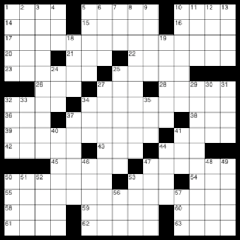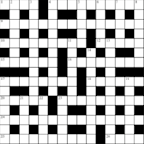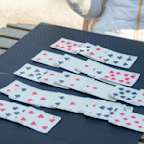Ad
related to: distractible raycon code word crossword
Search results
Results From The WOW.Com Content Network
On 18 August 1942, a day before the Dieppe raid, 'Dieppe' appeared as an answer in The Daily Telegraph crossword (set on 17 August 1942) (clued "French port"), causing a security alarm. The War Office suspected that the crossword had been used to pass intelligence to the enemy and called upon Lord Tweedsmuir, then a senior intelligence officer ...
Code word (communication) In communication, a code word is an element of a standardized code or protocol. Each code word is assembled in accordance with the specific rules of the code and assigned a unique meaning. Code words are typically used for reasons of reliability, clarity, brevity, or secrecy.
A code word is a word or a phrase designed to convey a predetermined meaning to an audience who know the phrase, while remaining inconspicuous to the uninitiated. For example, a public address system may be used to make an announcement asking for "Inspector Sands" to attend a particular area, which staff will recognise as a code word for a fire or bomb threat, and the general public will ignore.
Markiplier (real name: Mark Fischbach) hosts “Distractible” with two of his longtime friends: Wade Barnes (whom “I think I’ve known since the sixth grade,” Fischbach says) and Bob ...
The International Radiotelephony Spelling Alphabet or simply Radiotelephony Spelling Alphabet, commonly known as the NATO phonetic alphabet, is the most widely used set of clear-code words for communicating the letters of the Roman alphabet. Technically a radiotelephonic spelling alphabet, it goes by various names, including NATO spelling ...
The codes were changed from time to time to reflect current needs. By 1922 most railways in the country had agreed on standard code words, although the GWR had an extended list of codes that could only be used within its own network. In 1943 all railways were brought into a single system of codes and the GWR special codes were discontinued.
Code word (figure of speech), designed to convey a predetermined meaning to a receptive audience, while remaining inconspicuous to others. Procedure word, in voice communication. Code word, an element of a codebook designed so that the meaning of the code word is opaque without the code book. Code name, a clandestine name or cryptonym used to ...
Distraction is the process of diverting the attention of an individual or group from a desired area of focus and thereby blocking or diminishing the reception of desired information. Distraction is caused by: the lack of ability to pay attention; lack of interest in the object of attention; or the great intensity, novelty or attractiveness of ...
Android. Release. February 15, 1942; 82 years ago. ( 1942-02-15) Genre (s) Word game. Mode (s) Single-player. The New York Times Crossword (marketed as The Crossword) is a daily American-style crossword puzzle published in The New York Times as part of The New York Times Games, online on the newspaper's website, syndicated to more than 300 ...
The Allied military phonetic spelling alphabets prescribed the words that are used to represent each letter of the alphabet, when spelling other words out loud, letter-by-letter, and how the spelling words should be pronounced for use by the Allies of World War II. They are not a "phonetic alphabet" in the sense in which that term is used in ...








